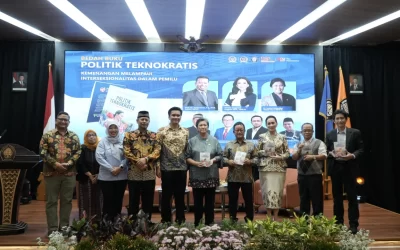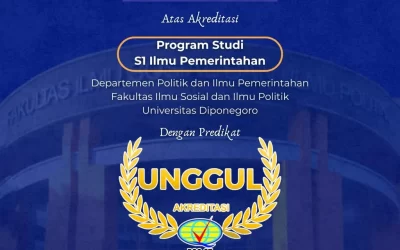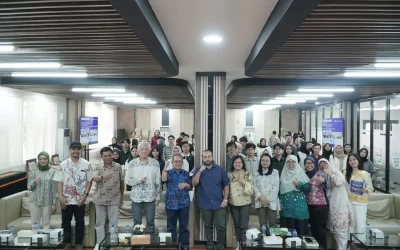Semarang — The Bureaucracy and Governance Expertise Group (KBK), Department of Politics and Government Science at the Faculty of Social and Political Sciences (FISIP), Diponegoro University (Undip), in cooperation with Transparency International (TI) Indonesia, held an anti-corruption workshop for students entitled “Training on Investigating and Mapping Corruption Actors” on Wednesday, November 26, 2025, at the Student Activity Center Room, Building D, FISIP Undip. The three-hour training, held from 12:30 to 15:30, was attended by students from six universities: Diponegoro University (Undip), Semarang State University (Unnes), Semarang University (USM), Muhammadiyah University of Semarang (Unimus), Walisongo State Islamic University (UIN), and UIN Salatiga.
This training was the follow-up session to the morning’s Public Discussion entitled “Democracy, Policy, and the Future of Civil Space,” featuring three speakers: Danang Widoyoko, Ph.D, Secretary-General of TI Indonesia; Dr. Kushandajani, M.S., lecturer at FISIP Undip; and Zakki Amali, Research Manager at Trendasia.org. Attended by more than 180 students from various study programs, the discussion particularly highlighted the emergence of new potential hotspots for corruption under the administration of President Prabowo Subianto.
After a break following the seminar, the 36 selected participants continued with the training session, led directly by the Transparency International (TI) Indonesia team and assisted by several Government Science lecturers from Undip as facilitators. Notably, the Secretary General of TII, Danang Widoyoko, was present in person to provide a foundational understanding of corruption from multiple perspectives. He gave a comprehensive and easily understood breakdown of the types of corruption, both those regulated by law and those obscured by social norms. He also introduced the Corruption Perceptions Index (CPI), the most widely used instrument by global anti-corruption networks to measure corruption in various countries.
The next session was led by Bagus Pradana, MRDM, a TII researcher, who taught about Beneficial Ownership (BO) mapping. This was the liveliest session, as participants practiced firsthand how to uncover who is really behind a company. “Sometimes, when there’s a company polluting the environment or damaging an area, we don’t know who’s behind it, because often the shares are owned by other companies. Through Beneficial Ownership (BO) analysis, we can find the actual people—not just company names. We can discover the names of officials, businesspeople, even religious figures behind problematic companies,” said Bagus during the session.
Participants were divided into four groups, each competing to find the most influential person behind each company. The training atmosphere was lively, as each group often came up with different results. The exercise was much like finding a needle in a haystack, requiring keen observation and meticulousness to discover who’s behind a company’s “shell,” and even calculate their share of ownership.
At the end of the session, Lisda BR Girsang, a student from the Faculty of Law at Semarang University (USM), said this kind of training was very important and beneficial for students, especially to help them maximize their role as agents of change. “But if possible, I hope the capacity can be increased in the future; so many of my friends did not make it in. I feel lucky, but at the same time, I feel bad for those who weren’t selected,” Lisda said hopefully.




0 Comments